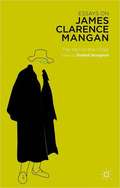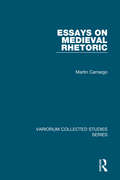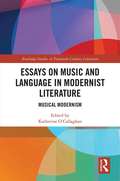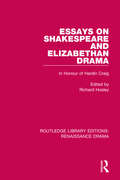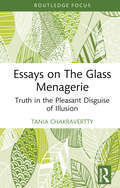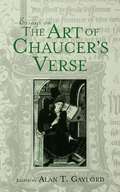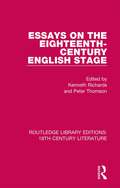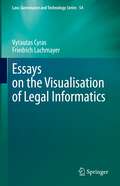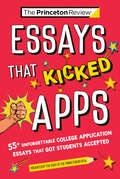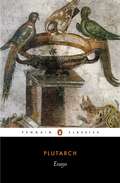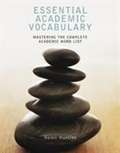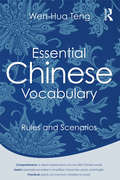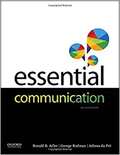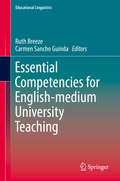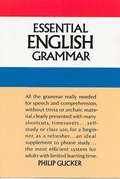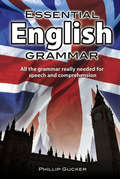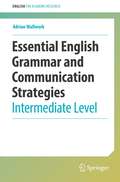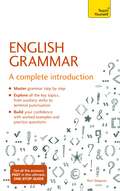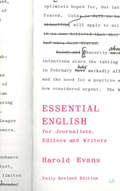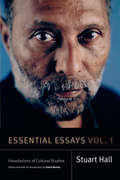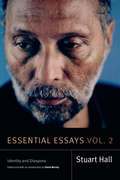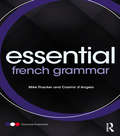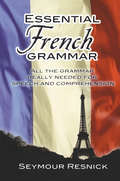- Table View
- List View
Essays on James Clarence Mangan: The Man in the Cloak
by Sinéad SturgeonThis is the first collection of essays to focus on the extraordinary literary achievement of James Clarence Mangan (1803-1849), increasingly recognized as one of the most important Irish writers of the nineteenth century. It features contributions by acclaimed contemporary writers including Paul Muldoon and Ciaran Carson.
Essays on Medieval Rhetoric (Variorum Collected Studies #1006)
by Martin CamargoOriginally published between 1981 and 2003, the thirteen essays collected here cover topics in medieval rhetoric from its origins in late antiquity through the end of the Middle Ages. Most of the essays are concerned with the teaching of prose composition, especially the art of letter writing known as the ars dictaminis, and many of them focus on specific textbooks that were used for such instruction, in particular those composed in England from the twelfth through the fifteenth centuries. Individual essays are devoted to works by major figures such as Saint Augustine, Peter of Blois, and Geoffrey of Vinsauf; to teaching programmes at important academic centres such as Oxford and Bologna; and to such topics as the relationship between the art of letter writing and the art of poetry, the oral dimension of medieval epistolography, the manuscript traditions of influential textbooks, medieval genre terminology, and the position of medieval rhetoric within a continuous disciplinary history rooted in classical rhetoric.
Essays on Music and Language in Modernist Literature: Musical Modernism (Routledge Studies in Twentieth-Century Literature)
by Katherine O'CallaghanThis volume explores the role of music as a source of inspiration and provocation for modernist writers. In its consideration of modernist literature within a broad political, postcolonial, and internationalist context, this book is an important intervention in the growing field of Words and Music studies. It expands the existing critical debate to include lesser-known writers alongside Joyce, Woolf, and Beckett, a wide-ranging definition of modernism, and the influence of contemporary music on modernist writers. From the rhythm of Tagore’s poetry to the influence of jazz improvisation, the tonality of traditional Irish music to the operas of Wagner, these essays reframe our sense of how music inspired Literary Modernism. Exploring the points at which the art forms of music and literature collide, repel, and combine, contributors draw on their deep musical knowledge to produce close readings of prose, poetry, and drama, confronting the concept of what makes writing "musical." In doing so, they uncover commonalities: modernist writers pursue simultaneity and polyphony, evolve the leitmotif for literary purposes, and adapt the formal innovations of twentieth-century music. The essays explore whether it is possible for literature to achieve that unity of form and subject which music enjoys, and whether literary texts can resist paraphrase, can be simply themselves. This book demonstrates how attention to the role of music in text in turn illuminates the manner in which we read literature.
Essays on Shakespeare and Elizabethan Drama: In Honour of Hardin Craig (Routledge Library Editions: Renaissance Drama #Vol. 5)
by Richard HosleyThe twenty-eight essays of this collection, first published in 1962, are the work of distinguished British, Canadian, and American scholars. The essays range widely over the field of Elizabethan drama, concentrating attention on Shakespeare and Marlowe but not neglecting earlier dramatists such as Kyd and Greene or later ones such as Heywood and Massinger. Among the general topics treated are the staging of the interludes, intrigue in Elizabethan tragedy, and Jacobean stage pastoralism. This title will be of interest to students of English literature.
Essays on The Glass Menagerie: Truth in the Pleasant Disguise of Illusion (Routledge Focus on Literature)
by Tania ChakraverttyThis volume traces the growth of Tennessee Williams from being a fragile child to becoming one of America’s greatest playwrights, also highlighting the playwright’s deep indebtedness to the Southern literary conventions. The book analyses Williams’s wonderful play with the sense of time and shows how in The Glass Menagerie as in all memory plays, the protagonist ruminates over the past, re-evaluates himself in that context and has a deeper understanding of the present, eventually using memory to recover from past trauma. One of the chapters analyses the use of the new form in Menagerie that Williams and his contemporaries had begun experimenting with, what Williams referred to as ‘plastic theatre’. Twentieth century American poetic drama, turned out to be contemporary, seeking the universal emotional and psychic truths and simultaneously portraying American life and culture with authenticity. The book also involves an in-depth study of the characters in Menagerie. Tom Wingfield has been critiqued in relationship to the absent father, the formidable mother and the soulmate sister; and the author has focused on, amongst many things, the gender issue. She has provided an analysis and critique of the reproduction of sex and gender and has brought the reader’s attention to Tom Wingfield’s and the playwright’s own struggle to strike a balance between the masculine and the feminine.
Essays on the Art of Chaucer's Verse (Basic Readings in Chaucer and His Time #3)
by Alan T. GaylordThese fifteen essays, four of them commissioned for this volume, along with a discursive introduction which sets each essay into place and comments on its distinctive features, represent a gathering never before attempted: a symposium on Chaucer's craft that concentrates on his poetic forms, his rhythms, his riming, his versification, his prosody. In his seminal essay, Scanning the Prosodists, Alan Gaylord (the editor of this volume) had asked: To show how Chaucer moves, and in moving, moves us: is that not what the study of his prosody should do? Should it not identify a pattern of sounds in motion, a regular and expressive succession which is part of the order of verse and a major component of its effectiveness? In the two decades that followed that essay, a number of distinguished scholars provided a variety of answers for such questions, arising from the authors' work as metrical theorists, or editors of medieval verse, or literary historians, or critics -- but in every case, such work connected to the initiatives and discoveries of the classroom. The best written and most useful of those essays, by recognized authorities in their fields, have been included in this volume. The volume will be of use to the advanced student of Chaucer and medieval poetry, and to the teacher interested in identifying, explaining, and bringing to life the patterns of sound and sense in Chaucer's verse. The extensive master Bibliography for the whole volume comprises a library of references which will have been reviewed and discussed in the essays.
Essays on the Eighteenth-Century English Stage (Routledge Library Editions: 18th Century Literature)
by Peter Thomson Kenneth R. RichardsThe eighteenth century produced more inventive actors than fine dramatists, and it displayed its actors to increasing advantage as theatre management became more expert, and stage design more ambitious. First published in 1972, the eleven papers collected in The Eighteenth-Century English Stage, originally read at a Manchester University Symposium in July 1971, follow this historical emphasis. Two papers are centred on dramatists, four on actors, three on managers, and two on designers. Malcolm Kelsall analyses Steele’s debt to Terence, using his classical scholarship as illuminatingly as Edgar Roberts uses his musical scholarship in writing about the songs in Fielding’s plays. George Taylor compares and evaluates a number of theories of acting, and speculates on the likely relevance of the best-known books on rhetoric, whilst Kathleen Barker, Arnold Hare, and David Rostron consider the work of individual actors – Powell, Cooke, and John Kemble. Theatre managers are represented by John Rich in Paul Sawyer’s sympathetic account, Thomas Harris, who is given new life in the recent researches of Cecil Price, and Stephen Kemble, fixed by Kenneth Robinson in canny control of the Newcastle theatre circuit. Finally, Graham Barlow reaches some controversial conclusions about the dimensions of the Theatre Royal, Drury Lane, by subjecting Thornhill’s sketches to a practising designer’s statistical examination, and Sybil Rosenfeld carries a stage further her pioneering work on eighteenth-century scene-painting and design. The two last are attractively illustrated by 8 pages of plates. This book’s particular value lies in its bringing together several simply presented but deeply informed explorations of often neglected aspects of the eighteenth-century theatre. The papers, with their general sense of enthusiasm and concern for their subject, will interest all students of the eighteenth century, and theatre enthusiasts in particular.
Essays on the Visualisation of Legal Informatics (Law, Governance and Technology Series #54)
by Vytautas Cyras Friedrich LachmayerBoth legal scholars and computer scientists will be curious to know how the gap between law and computing can be bridged. The law, and also jurisprudence, is based on language, and is mainly textual. Every syntactic system has its semantic range, and so does language, which in law achieves a high degree of professional precision. The use of visualisations is a syntactic supplement and opens up a new understanding of legal forms. This understanding was reinforced by the paradigm shift from textual law to legal informatics, in which visual formal notations are decisive. The authors have been dealing with visualisation approaches for a long time and summarise them here for discussion. In this book, a multiphase transformation from the legal domain to computer code is explored. The authors consider law enforcement by computer. The target view is that legal machines are legal actors that are capable of triggering institutional facts. In the visualisation of statutory law, an approach called Structural Legal Visualisation is presented. Specifically, the visualisation of legal meaning is linked with tertium comparationis, the third part of the comparison. In a legal documentation system, representing one legal source with multiple documents is viewed as a granularity problem. The authors propose to supplement legislative documents ex ante with explicit logic-oriented information in the form of a mini thesaurus. In contrast to so-called strong relations such as synonymy, antonymy and hypernymy/hyponymy, one should consider weak relations: (1) dialectical relations, a term of dialectical antithesis; (2) context relations; and (3) metaphorical relations, which means the use of metaphors for terms. The chapters trace topics such as the distinction between knowledge visualisation and knowledge representation, the visualisation of Hans Kelsen’s Pure Theory of Law, the separation of law and legal science, legal subsumption, legal relations, legal machines, encapsulation, compliance, transparency, standard cases and hard cases.
Essays that Kicked Apps: 55+ Unforgettable College Application Essays that Got Students Accepted (College Admissions Guides)
by The Princeton ReviewEach year, colleges are inundated with earnest, eager applications. Your own essay may need to shine from among as many as 60,000 others to get noticed! · Get inspired by these 55+ unforgettable student essays that got their authors accepted · See what schools like Cornell, Brown, Georgia Tech, Rutgers, Northwestern University, Duke, and many more are looking for in an essay · Read helpful commentary from our experts on what worked—and why All the essays collected in this book are real examples of successful, stand-out writing, and each is annotated with explanations from The Princeton Review&’s admissions experts about its most memorable or effective techniques. Get reading—and then writing—and let these model essays give you the kick-app advantage!
Essays: Ethical Essays
by PlutarchOne of the greatest essayists of the Graeco-Roman world, Plutarch (c. AD 46 -120) used an encyclopedic knowledge of the Roman Empire to produce a compelling and individual voice. In this superb selection from his writings, he offers personal insights into moral subjects that include the virtue of listening, the danger of flattery and the avoidance of anger, alongside more speculative essays on themes as diverse as God's slowness to punish man, the use of reason by supposedly 'irrational' animals and the death of his own daughter. Brilliantly informed, these essays offer a treasure-trove of ancient wisdom, myth and philosophy, and a powerful insight into a deeply intelligent man.
Essential Academic Vocabulary: Mastering The Complete Academic Word List
by Helen HuntleyEssential Academic Vocabulary prepares students for academic success by helping them preview, learn, and practice vocabulary from the Academic Word List in context. Engaging academic readings highlight chapter vocabulary in context. From chapter to chapter, the readings and vocabulary increase in complexity level, allowing students to establish and build upon a solid vocabulary foundation.
Essential Chinese Vocabulary: Rules and Scenarios
by Wen-Hua TengEssential Chinese Vocabulary: Rules and Scenarios is an indispensable guide for beginner to intermediate students of Chinese who wish to use essential Chinese words and phrases accurately. The book provides the crucial context and explanations of grammar structures and language rules related to important Chinese words and phrases, too often glossed over in primary textbooks. Students are given the tools necessary to refine their use of these words and phrases in order to communicate effectively in Chinese. Key features: In-depth explanations of commonly used words and phrases contextualized with a range of authentic examples providing learners with a comprehensive understanding of the vocabulary-use and allowing them to express themselves more accurately and appropriately. Bridges the gap between grammar and vocabulary by presenting the frequently-ignored rules that govern the use of words and phrases. Clear and systematic comparisons between the uses of ostensibly similar words, highlighting the nuances of the Chinese language. Examples provided in Chinese characters, pinyin and English. Extensive cross-references. Essential Chinese Vocabulary is a unique reference and useful complement to basic and intermediate Chinese language textbooks.
Essential Communication
by George Rodman Athena Du Pré Ronald AdlerThis is no ordinary textbook. With its revamped design, highly visual features, and concise coverage, the second edition of Essential Communication is a practical, interactive guide for students. Exercises and self quizzes help students reflect on their own communication patterns and improve their skills. Focused on the fundamentals, every element of this text helps students become better communicators online, in person, at home, and at work.
Essential Competencies for English-medium University Teaching
by Carmen Sancho Guinda Ruth BreezeAs English gains prominence as the language of higher education across the world, many institutions and lecturers are becoming increasingly concerned with the implications of this trend for the quality of university teaching and learning. With an innovative approach in both theme and scope, this book addresses four major competencies that are essential to ensure the effectiveness of English-medium higher education: creativity, critical thinking, autonomy and motivation. It offers an integrated perspective, both theoretical and practical, which defines these competences from different angles within ELT and Applied Linguistics, while also exploring their points of contact and applications to classroom routines. This approach is intended to provide practical guidance and inspiration, in the form of pedagogical proposals, examples of teaching practice and cutting-edge research by scholars and university teachers from all over the world. To that end, a leading specialist in the field introduces each of the four competencies, explaining concepts accessibly and synthetically, exposing false myths, presenting an updated state of the art, and opening windows for future studies. These introductions are followed by practitioner chapters written by teachers and scholars from different cultures and university contexts, who reflect on their experience and/or research and share effective procedures and suggestions for the university class with English as a vehicle for instruction.
Essential Emily Dickinson
by J. Srihari RaoThis small volume is a modest attempt at understanding the most essential characteristics of Emily Dickinson’s poetry. It does not purport to be any significant contribution to the Emily Dickinson—criticism, nor do I claim any originality in interpreting the poems.
Essential English Grammar
by Philip GuckerThis logical, developmental presentation of the major aspects of English grammar includes all the necessary tools for speech and comprehension. Designed for adults with limited learning time who wish to acquire the basics of everyday English, this grammar book features numerous shortcuts and timesavers. Ideal as an introduction, supplement, or refresher.
Essential English Grammar
by Philip GuckerThis English grammar has been specially designed for readers with limited learning time, who wish to gain command of all the important points of grammar needed for everyday speech and comprehension, yet who do not wish to be unnecessarily burdened with archaic, highly literary, or seldom used forms. Summarizing all the major constructions, principles, and basic terminology, this book will provide readers with a firm foundation in essential English grammar.The text proceeds in easy, natural steps, beginning with simple sentence structure and advancing logically to more difficult constructions. More than 600 practice exercises and solutions make this an excellent home-study text. Organized with clarity and emphasizing explanation rather than rote memorization, this selective grammar can be used effectively as a course supplement, as an introduction for beginners, or as a reference for students and teachers.
Essential English Grammar and Communication Strategies: Intermediate Level (English for Academic Research)
by Adrian WallworkThis book is for university students, with at least a mid-intermediate level of English. It is designed both for self-study and also as a support for a course on academic communication. It can thus be used alongside the companion volumes: Writing an Academic Paper in English and Giving an Academic Presentation in English. The book focuses only on those areas that are either the most commonly found in academic communication and/or cause the most problems. It is thus considerably more accessible than a traditional grammar or style guide. Grammar coverage includes: articles (a/an, the), countable vs uncountable nouns, modal verbs (can, may, could, might), comparisons, present and past tenses, link words, prepositions, and verbs that cause grammatical difficulties. There is a strong focus on those elements that make a paper more readable, and a presentation more accessible and memorable: clarity and empathy, sentence length, word order, and punctuation. There are chapters on two key areas of communication in academia: writing emails to editors, drafting a CV/resume. The book is laid out simply, with short explanations, and lots of example sentences (plus typical mistakes). Other books in the series: Writing an Academic Paper in English Giving an Academic Presentation in English Adrian Wallwork is the author of more than 40 ELT and EAP textbooks. He has trained several thousand PhD students and researchers from around 50 countries to write research papers and give presentations. He is also the co-founder of e4ac.com, an editing agency for non-native English-speaking researchers.
Essential English Grammar: A Complete Introduction
by Ron Simpson Brigitte EdelstonEssential English Grammar is packed with easy-to-follow explanations and summaries, practical tips on how to avoid common grammar mistakes, interesting facts about the historical and regional use of English and a special section on punctuation. This clear, straightforward guide to modern English grammar will help you to improve your knowledge of the language and perfect your grammar.NOT GOT MUCH TIME?One, five and ten-minute introductions to key principles to get you started.AUTHOR INSIGHTSLots of instant help with common problems and quick tips for success, based on the author's many years of experience.TEST YOURSELFTests in the book and online to keep track of your progress.EXTEND YOUR KNOWLEDGEExtra online articles at www.teachyourself.com to give you a richer understanding of English grammar.FIVE THINGS TO REMEMBERQuick refreshers to help you remember the key facts.TRY THISInnovative exercises illustrate what you've learnt and how to use it.
Essential English Grammar: A Complete Introduction (TY English Reference)
by Ron Simpson Brigitte EdelstonEssential English Grammar is packed with easy-to-follow explanations and summaries, practical tips on how to avoid common grammar mistakes, interesting facts about the historical and regional use of English and a special section on punctuation. This clear, straightforward guide to modern English grammar will help you to improve your knowledge of the language and perfect your grammar.NOT GOT MUCH TIME?One, five and ten-minute introductions to key principles to get you started.AUTHOR INSIGHTSLots of instant help with common problems and quick tips for success, based on the author's many years of experience.TEST YOURSELFTests in the book and online to keep track of your progress.EXTEND YOUR KNOWLEDGEExtra online articles at www.teachyourself.com to give you a richer understanding of English grammar.FIVE THINGS TO REMEMBERQuick refreshers to help you remember the key facts.TRY THISInnovative exercises illustrate what you've learnt and how to use it.
Essential English for Journalists, Editors and Writers
by Harold Evans Crawford GillanEssential English is an indispensable guide to the use of words as tools of communication. It is written primarily for journalists, yet its lessons are of immense value to all who face the problem of giving information, whether to the general public or within business, professional or social organisations.FULLY REVISED AND UPDATED BY CRAWFORD GILLANRECOMMENDED BY THE SOCIETY OF EDITORS
Essential Essays, Volume 1: Foundations of Cultural Studies (Stuart Hall: Selected Writings)
by Stuart Hall David MorleyFrom his arrival in Britain in the 1950s and involvement in the New Left, to founding the field of cultural studies and examining race and identity in the 1990s and early 2000s, Stuart Hall has been central to shaping many of the cultural and political debates of our time. Essential Essays—a landmark two-volume set—brings together Stuart Hall's most influential and foundational works. Spanning the whole of his career, these volumes reflect the breadth and depth of his intellectual and political projects while demonstrating their continued vitality and importance.Volume 1: Foundations of Cultural Studies focuses on the first half of Hall's career, when he wrestled with questions of culture, class, representation, and politics. This volume's stand-out essays include his field-defining “Cultural Studies and Its Theoretical Legacies"; the prescient “The Great Moving Right Show,” which first identified the emergent mode of authoritarian populism in British politics; and “Encoding and Decoding in the Television Discourse,” one of his most influential pieces of media criticism. As a whole, Volume 1 provides a panoramic view of Hall's fundamental contributions to cultural studies.
Essential Essays, Volume 2: Identity and Diaspora (Stuart Hall: Selected Writings)
by Stuart Hall David MorleyFrom his arrival in Britain in the 1950s and involvement in the New Left, to founding the field of cultural studies and examining race and identity in the 1990s and early 2000s, Stuart Hall has been central to shaping many of the cultural and political debates of our time. Essential Essays—a landmark two-volume set—brings together Stuart Hall's most influential and foundational works. Spanning the whole of his career, these volumes reflect the breadth and depth of his intellectual and political projects while demonstrating their continued vitality and importance.Volume 2: Identity and Diaspora draws from Hall's later essays, in which he investigated questions of colonialism, empire, and race. It opens with “Gramsci's Relevance for the Study of Race and Ethnicity,” which frames the volume and finds Hall rethinking received notions of racial essentialism. In addition to essays on multiculturalism and globalization, black popular culture, and Western modernity's racial underpinnings, Volume 2 contains three interviews with Hall, in which he reflects on his life to theorize his identity as a colonial and diasporic subject.
Essential French Grammar
by Mike Thacker Casimir D'AngeloEssential French Grammar is an innovative reference grammar and workbook for intermediate and advanced undergraduate students of French (CEFR levels B2 to C1). Its clear explanations of grammar are supported by contemporary examples and lively cartoon drawings. Each chapter contains:* real-life language examples in French, with English translations* a 'key points' box and tables that summarise grammar concepts* a variety of exercises to reinforce learning* a contemporary primary source or literary extract to illustrate grammar in context.To aid your understanding, this book also contains a glossary of grammatical terms in French and English, useful verb tables and a key to the exercises.Together, these features all help you to grasp complex points of grammar and develop your French language skills.
Essential French Grammar
by Seymour ResnickThis is the first French grammar designed specifically for adults with limited learning time who wish to acquire a knowledge of simple, everyday spoken French, and who have no need of all the archaic, highly literary, and seldom used forms that must be covered in a conventional grammar. It is not a simplified study, but a selective grammar that points out many time-saving short cuts.Constantly drawing comparisons with English construction, it covers all of the important points in French grammar (verb forms and tenses, parts of speech, negative sentences, possessives, partitive construction, etc.) fully and logically, and with refreshing clarity. It was created for those who prefer the phrase approach, and all grammatical points are illustrated with phrases and sentences that you can incorporate directly into your working vocabulary. Many of the discussions include a list of common expressions that use the rule under study.In addition to the grammar text itself, there are several unusual features of great value to anyone who wants to build a French vocabulary: a section on common word-endings and their French equivalents, for example, and a 50-page lit of French-English cognates.This grammar does not assume any previous knowledge either of grammatical terms or of French grammar. English grammatical terms are explained in a separate section and all discussion begins with essentials and works up from there. Use it as an introduction to grammar, for independent class courses, with phrase courses, as a refresher, or for beginning self-study.
